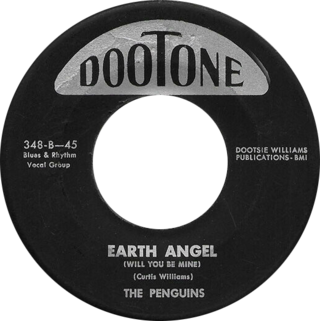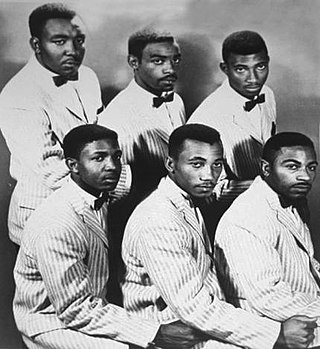Related Research Articles
The Penguins were an American doo-wop group from Los Angeles, California, that were active during the 1950s and early 1960s. They are known for their 1954 hit song, "Earth Angel", which was one of the first rhythm and blues songs to cross over to the pop charts. The song would ultimately prove to be their only success. The song peaked at No. 8 on the US Billboard Best Sellers in Stores pop chart but had a three-week run at No. 1 on the R&B chart.

Doo-wop is a genre of rhythm and blues music that originated in African-American communities during the 1940s, mainly in the large cities of the United States, including New York, Philadelphia, Pittsburgh, Chicago, Baltimore, Newark, Detroit, Washington, D.C., and Los Angeles. It features vocal group harmony that carries an engaging melodic line to a simple beat with little or no instrumentation. Lyrics are simple, usually about love, sung by a lead vocal over background vocals, and often featuring, in the bridge, a melodramatically heartfelt recitative addressed to the beloved. Harmonic singing of nonsense syllables is a common characteristic of these songs. Gaining popularity in the 1950s, doo-wop was "artistically and commercially viable" until the early 1960s, but continued to influence performers in other genres.
The Belmonts were an American doo-wop group from the Bronx, New York, that originated in the mid-1950s. The original group consisted of Angelo D'Aleo, Carlo Mastrangelo, and Fred Milano. They took their name from Belmont, the Bronx street in which Mastrangelo lived, known as the Little Italy of the Bronx. From 1958–60 the group performed with Dion DiMucci as Dion and the Belmonts. At this time Mastrangelo sang the bass parts, Milano the second tenor, D'Aleo the falsetto, and DiMucci did lead vocals. Mastrangelo was replaced in 1962 by Frank Lyndon and Warren Gradus, but the original group reunited in 1966, and thereafter performed together in numerous reunions over the years. They occasionally recorded new singles into the 1980s and performed live until the death of Milano in 2011. Gradus continued, performing live under the moniker until his death in October 2023.

"Earth Angel", occasionally referred to as "Earth Angel (Will You Be Mine)", is a song by American doo-wop group the Penguins. Produced by Dootsie Williams, it was released as their debut single in October 1954 on Dootone Records. The Penguins had formed the year prior and recorded the song as a demo in a garage in South Central Los Angeles. The song's origins lie in multiple different sources, among them songs by Jesse Belvin, Patti Page, and the Hollywood Flames. Its authorship was the subject of a bitter legal dispute with Williams in the years following its release.

The Brooklyn Bridge is an American musical group, best known for their million-selling rendition of Jimmy Webb's "Worst That Could Happen" (1968).
Doo Wop 50 is a television and DVD special created and produced by TJ Lubinsky, grandson of Herman Lubinsky. The special was inspired by a 1994 CD box-set of doo wop music which was also a development and production partner WQED in the program and dvd. It aired in December 1999.

"Sh-Boom" is an early doo-wop song by the R&B vocal group The Chords. It was written by James Keyes, Claude Feaster, Carl Feaster, Floyd F. McRae, and William Edwards, members of The Chords, and published in 1954. It is sometimes considered the first doo-wop or rock 'n' roll record to reach the top ten on the pop charts, as it was a top-10 hit that year for both the Chords and The Crew-Cuts. In 2004, it was ranked No. 215 on Rolling Stone's "Top 500 Best Songs of All Time".

Maurice Williams and the Zodiacs were an American doo-wop/R&B vocal group in the late 1950s and early 1960s. Originally the (Royal) Charms, the band changed its name to the Gladiolas in 1957 and the Excellos in 1958, before finally settling on the Zodiacs in 1959.
Gaynel Hodge was an American recording artist, songwriter and pianist. He co-wrote the platinum hit 1950s song, "Earth Angel", and was a founding member and musical director of The Platters, The Turks, and The Hollywood Flames.

"The Wanderer" is a song written by Ernie Maresca and originally recorded by Dion, released on his 1961 album Runaround Sue. The song, with a 12-bar blues-base verse and an eight-bar bridge, tells the story of a travelling man and his many loves. The song is ranked number 243 on the Rolling Stone magazine's list of The 500 Greatest Songs of All Time.
The Del-Satins were an American vocal group, most active in the early 1960s, who recorded on their own but are best remembered for their harmonies on hit records for Dion and others. They have been described as having "few peers as practitioners of white doo-wop."

"Runaround Sue" is a rock and roll song, originally a US No. 1 Hot 100 hit for the singer Dion during 1961, after he split with the Belmonts. It was written by Dion with Ernie Maresca, and tells the story of a disloyal lover. The song ranked No. 351 on the Rolling Stone list of "The 500 Greatest Songs of All Time".
The Hollywood Flames were an American R&B vocal group in the 1950s, best known for their No. 11 hit "Buzz-Buzz-Buzz" in 1957.

Vocal harmony is a style of vocal music in which a consonant note or notes are simultaneously sung as a main melody in a predominantly homophonic texture. Vocal harmonies are used in many subgenres of European art music, including Classical choral music and opera and in the popular styles from many Western cultures ranging from folk songs and musical theater pieces to rock ballads. In the simplest style of vocal harmony, the main vocal melody is supported by a single backup vocal line, either at a pitch which is above or below the main vocal line, often in thirds or sixths which fit in with the chord progression used in the song. In more complex vocal harmony arrangements, different backup singers may sing two or even three other notes at the same time as each of the main melody notes, mostly with a consonant, pleasing-sounding thirds, sixths, and fifths.
"Memories of El Monte" is a doo-wop metasong released in 1963 by the Penguins featuring Cleve Duncan. It was written by Frank Zappa and Ray Collins before they were in the Mothers of Invention. The song was first released as Original Sound 27.

Carlo Mastrangelo was an American doo-wop and progressive rock singer. Born and raised in The Bronx, he lived in an apartment on the corner of 179th St. and Mapes Ave. He also played drums before and after The Belmonts with several groups.
The Rockin' Chairs were a doo-wop recording group based in Queens Village, New York active in 1958 and 1959.
Richard Nader (1940–2009) was a disk jockey and the entertainment promoter who pushed the concept of oldies mainstream, beginning with his first Rock and Roll Revival concert October 18, 1969, featuring Chuck Berry, The Platters, Bill Haley and the Comets, The Shirelles, The Coasters, Jimmy Clanton, and Sha Na Na.
References
- 1 2 3 4 5 Gilliland, John (1969). "Show 11 – Big Rock Candy Mountain: Early rock 'n' roll vocal groups & Frank Zappa" (audio). Pop Chronicles . University of North Texas Libraries. Track 5.
- ↑ Warner, Jay (2006). American Singing Groups: A History from 1940 to Today . Milwaukee, Wisconsin: Hal Leonard Corporation. p. 266. ISBN 0634099787.
- 1 2 Buck Ram (manager of Penguins and Platters) interviewed on the Pop Chronicles (1969)
- ↑ Rosalsky, Mitch (2002). Encyclopedia of Rhythm and Blues and Doo Wop Vocal Groups. Lanham, Maryland: Scarecrow Press. pp. 485–486. ISBN 978081083663-1.
- ↑ Gribin, Anthony (2000). The Complete Book of Doo-Wop. Krause Publications. p. 441. ISBN 978-0873418294.